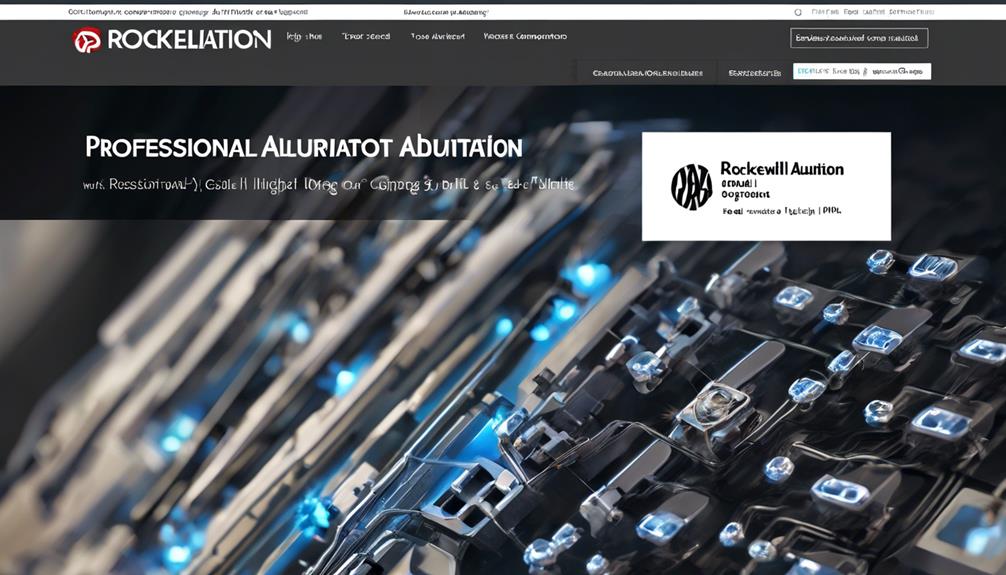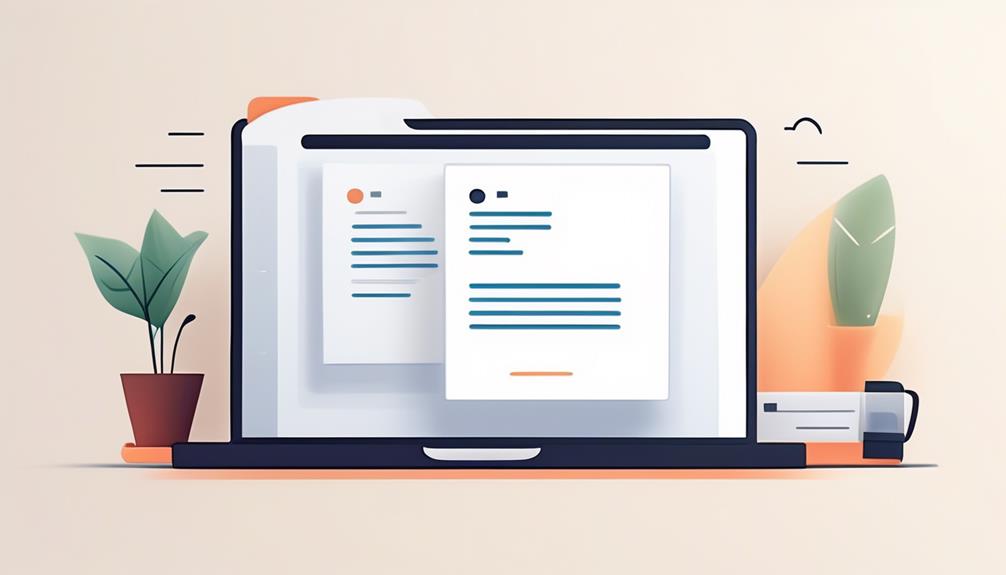In contacting a professor regarding research, it’s crucial that our correspondence is concise, courteous, and captivating. Yet, what is the best way to achieve this equilibrium? How can we express our enthusiasm for the topic without seeming too zealous?
Join us as we explore the key elements of crafting a well-written email to a professor about research, from the initial greeting to the request for a meeting.
Key Takeaways
- Thoroughly research the professor's background, including their published work, current projects, and awards.
- Craft a clear and concise subject line that indicates the content and importance of the email.
- Clearly communicate the specific research topic of interest and highlight relevant experience and qualifications.
- Request a meeting or discussion with a polite and professional tone, expressing eagerness for potential research collaboration and gratitude for the professor's time and expertise.
Understanding the Purpose
We're reaching out to professors to discuss their research because we're keen to understand their work and explore potential opportunities to contribute.
As undergraduates, we're interested in becoming involved in research and are eager to discuss the possibility of getting involved in your research projects. We understand the value of hands-on experience and are enthusiastic about the prospect of contributing to meaningful research in our academic field.
In our emails to faculty members, we aim to clearly state our interest in their research and personalize each email to demonstrate our genuine interest. We're mindful of keeping the emails professional, short, and to the point, while also offering available times to meet and discuss our interests in greater detail.
When reaching out, we make sure to mention our names, academic years, and majors in the introduction to provide a brief background about ourselves.
Researching the Professor

As we prepare to reach out to professors about their research, our first step is to thoroughly research each faculty member to effectively personalize our communication and demonstrate our genuine interest.
When researching the professor, it's crucial to delve into their published work and current projects, allowing us to gain a comprehensive understanding of their research focus and achievements. Additionally, exploring their educational background, professional experience, and any awards or accolades they've received can provide valuable insight into their expertise and interests.
By doing so, we can tailor our email to reflect a keen understanding of the professor's work and convey a genuine enthusiasm for the opportunity to discuss their research. This demonstrates our dedication and respect for the faculty's contributions to their field, fostering a sense of mutual admiration and respect in our communication.
Ultimately, this personalized approach not only showcases our sincere interest in the faculty's research but also sets the stage for a meaningful and productive discussion.
Crafting a Clear Subject Line
Crafting a clear and concise subject line is essential when emailing a professor about research, as it sets the tone for the communication and effectively communicates the purpose of the email. A well-crafted subject line immediately conveys the intention behind the email, increasing the likelihood of a prompt and relevant response.
When composing the subject line, it's crucial to be specific and to the point, using language that indicates the content and importance of the email. Including keywords related to the research opportunity or meeting request can also grab the professor's attention. For instance, if you're interested in discussing a specific research project, a subject line such as 'Meeting to Discuss [Research Project Title]' would clearly communicate the purpose of your email.
Avoid vague or general subject lines that could be misconstrued or overlooked. Remember, the subject line is the first thing the professor will see, so it needs to make a strong impression and compel them to open the email.
Crafting a clear subject line demonstrates professionalism and consideration for the professor's time, ultimately contributing to a more effective and respectful form of communication.
Greeting and Introduction

When reaching out to a professor about research, it's crucial to start with a proper salutation and a clear introduction. This sets the tone for a professional and engaging conversation.
We should also express our interest in a specific research topic to demonstrate our preparedness and focus.
Proper Email Salutation
We recently discovered some valuable guidelines for crafting a proper email salutation when reaching out to a professor about research.
When addressing a professor, it's crucial to use a clear and concise subject line that indicates the purpose of the email.
Additionally, it's important to address the recipient with a proper title, such as 'Dear Dr. [Last Name]', to show respect and professionalism. Vague greetings like 'To whom it may concern' should be avoided as they can come across as impersonal.
When introducing yourself, stating your year in school and your major or anticipated major can help to establish your academic background.
Expressing your genuine interest in research and mentioning the specific research topic you're interested in can demonstrate your enthusiasm and commitment to the subject.
Clear Research Topic
Our email should clearly communicate the specific research topic we're interested in, demonstrating our enthusiasm and commitment to the subject.
When writing an email to a faculty member expressing our interest in research, it's crucial to articulate our chosen research topic concisely and effectively. By clearly stating the research topic, we showcase our passion and dedication to the subject matter.
Additionally, we should discuss our relevant experience in the field, highlighting our qualifications and expertise. This will assure the professor of our capability and preparedness to engage in meaningful research discussions.
A clear and focused research topic in our email will convey professionalism and a genuine interest in the subject, laying the foundation for a potential research collaboration.
Concise Introduction
Dear Dr. [Last Name],
I am a second-year student majoring in Neuroscience, and I'm eager to discuss my interest in conducting research on the neurobiological mechanisms underlying memory formation. I've a deep passion for understanding the intricate processes that govern memory encoding and retrieval, and I'm enthusiastic about delving into this area of research under your guidance.
I'm driven by a desire to contribute to the advancement of our understanding of memory formation, which I believe is crucial for developing treatments for conditions like Alzheimer's disease.
I'm eager to learn from your expertise and contribute meaningfully to ongoing research in this field.
I am keen on scheduling a meeting to discuss potential opportunities for involvement in research projects. Thank you for considering my request.
Sincerely,
[Your Name]
Expressing Interest in Research

We're excited to share how to effectively express interest in research.
It's crucial to demonstrate genuine curiosity about the professor's work.
Research Interest Expression
Express your genuine interest in the professor's research by clearly and succinctly stating your enthusiasm and motivation to contribute to their work.
We're eager to join your research group and immerse ourselves in the exciting projects. We're passionate about delving into the complexities of [SUBJECT AREA] and are driven to make meaningful contributions.
We believe that being involved in research under your mentorship would provide an invaluable learning experience, shaping our academic and professional growth. The opportunity to meet with you and discuss your ongoing work would be immensely valuable.
We're eager to engage with the faculty member and gain insights into the research process. The chance to be involved in research alongside your team is something we're genuinely enthusiastic about.
Demonstrating Curiosity
Immersing ourselves in your research group would provide invaluable insights into the ongoing work and contribute significantly to our academic and professional growth.
As a [insert major or academic background], I'm deeply interested in research, particularly in [insert subject area]. Being involved in research in this field is crucial for my career goals, as it enhances my understanding and practical skills.
Your work, especially [mention specific research or publication], has caught our attention, and we're keen to learn more about the methodologies and findings.
I've thoroughly reviewed your profile and am interested in the work being done in your research group. I'd greatly appreciate the opportunity to discuss this further and would be happy to schedule a meeting or attend your office hours at your convenience.
Demonstrating Preparation

Having thoroughly researched the professor's work and identified specific areas of interest, we're prepared to demonstrate our alignment with their research through relevant experiences and coursework.
- We've gained valuable research experience through our involvement in several projects, which have equipped us with the skills necessary to contribute meaningfully to your research.
- This experience has deepened our understanding of the research process and the intricacies of conducting rigorous academic inquiries, instilling in us a deep appreciation for the complexities of your field.
After having reviewed your faculty page and read your paper on [paper title], we're genuinely interested in your research on [specific area of interest]. This aligns with the coursework we've completed, focusing on [relevant coursework]. We're confident that our background has provided us with a solid foundation to meaningfully engage in and contribute to your ongoing research.
We have also attached my resume, which outlines our academic and research experiences. We'd be honored to discuss how we can further contribute to your research and are available at your earliest convenience to meet and expand on our interest in your work.
Highlighting Relevant Experience
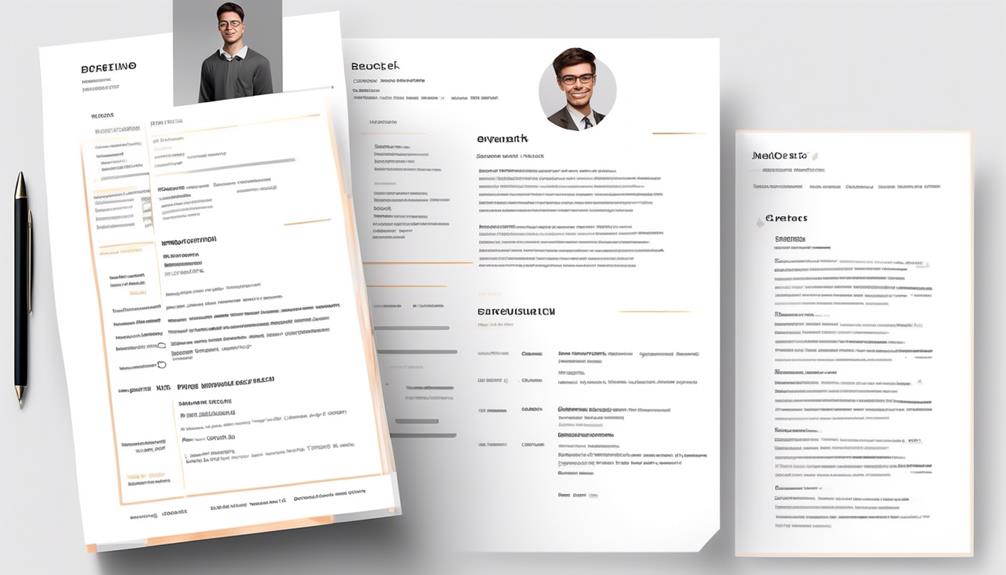
After immersing ourselves in relevant coursework and research experiences, we're eager to highlight how these have equipped us to contribute meaningfully to your ongoing research.
In our previous research project, we delved into the intricacies of [research topic], honing our skills in data analysis and experimental design. Additionally, our involvement in [Student Research] provided valuable insight into the practical application of theoretical concepts, further fueling our interest in research.
Through these experiences, we've developed a strong foundation in literature review and academic writing, culminating in a publication in [relevant journal or conference proceedings].
Our coursework in [specific relevant courses] has equipped us with a solid understanding of [specific techniques or methodologies], which we believe will be invaluable in contributing to your research endeavors.
We're eager to discuss how our background can add value to your team and are prepared to provide further details about our research experience and skill set.
Please find our contact information below and don't hesitate to reach out for any additional information.
Requesting a Meeting or Discussion

We need to address the best approach for inquiring about meeting availability and scheduling a discussion with the professor.
It's important to convey our interest and qualifications while also being considerate of the professor's time.
We should also discuss how to effectively request a brief meeting to discuss our research interests and potential contributions to the professor's work.
Meeting Availability Inquiry
To discuss potential research opportunities, I'm writing to request a meeting at your earliest convenience.
- We understand the value of your time and expertise, and we're available to meet during your office hours.
- We believe that a face-to-face discussion would be invaluable in gaining insight into your current research projects and potential areas for collaboration.
- We'd appreciate an opportunity to discuss how our research interests align and explore possibilities for working together.
We look forward to hearing from you regarding your availability for a meeting. Thank you for considering our request, and we're eager to engage in a meaningful conversation about potential research collaboration.
Scheduling a Discussion
With a keen interest in your research and a desire to explore potential collaboration opportunities, we are eager to schedule a discussion at your earliest convenience. We believe that a face-to-face meeting would be beneficial to discuss potential research opportunities. Please let us know a convenient time next week to discuss this further. Additionally, if there are any specific documents or information you would like us to bring to the meeting, please inform us in advance. We are flexible and can work around your schedule. If you prefer, we could also schedule a phone discussion at your convenience. Please find our contact number below.
| Monday | Wednesday | Friday |
|---|---|---|
| 10:00 am – 12:00 pm | 2:00 pm – 4:00 pm | 9:00 am – 11:00 am |
We are looking forward to meeting with you to discuss this exciting opportunity further. Thank you for considering our request.
Seeking a Brief Meeting
Request a brief meeting with Dr. [Last Name] to discuss potential research collaboration opportunities. We're eager to meet with Dr. [Last Name] and look forward to talking about the exciting research projects being undertaken.
We appreciate the opportunity to be involved in research with Dr. [Last Name] and are keen to discuss how we can contribute to ongoing work. It's essential for us to become involved in research and gain insights from Dr. [Last Name]'s expertise.
We're excited about the prospect of meeting and discussing potential research collaborations, and we believe that a brief meeting would be invaluable for both parties. Thank you for considering our request, and we're hopeful for the chance to meet with you.
Polite and Professional Tone

Maintaining a formal and respectful tone throughout the email is essential when communicating with a professor about research opportunities. It is crucial to convey a polite and professional tone to show respect for the professor’s time and expertise. When writing an email to a professor, it’s important to use language that is contextually relevant and appropriate for the academic setting. This includes addressing the professor with the appropriate title, such as ‘Dear Dr. [Last Name]’, and avoiding the use of slang, abbreviations, or emoticons in the message. Additionally, being concise and to the point while maintaining a polite demeanor is key. Proofreading the email for spelling and grammar errors before sending is also essential to ensure a high level of professionalism. Below is a table highlighting the do’s and don’ts of maintaining a polite and professional tone when writing an email to a professor about research opportunities: When requesting a meeting or discussing potential research opportunities, it’s important to express gratitude for the professor’s time and consideration. This demonstrates an understanding of the professor’s busy schedule and a willingness to be respectful of their time. Another important aspect of maintaining a respectful tone in emails to professors is to avoid making demands or coming across as entitled. Instead, focus on presenting yourself as a motivated and dedicated student who is eager to learn and contribute to their research. Overall, understanding how to be respectful in emails is crucial for building a positive and professional relationship with professors.
| Do's | Don'ts |
|---|---|
| Use formal language and respectful | Use slang, abbreviations, or emoticons |
| Address the professor appropriately | Use informal language or casual greetings |
| Be concise and to the point | Ramble or use unnecessary fluff |
| Proofread for errors before sending | Send without checking for mistakes |
| Express gratitude for their time | Forget to show appreciation for their time |
Closing and Sign-off
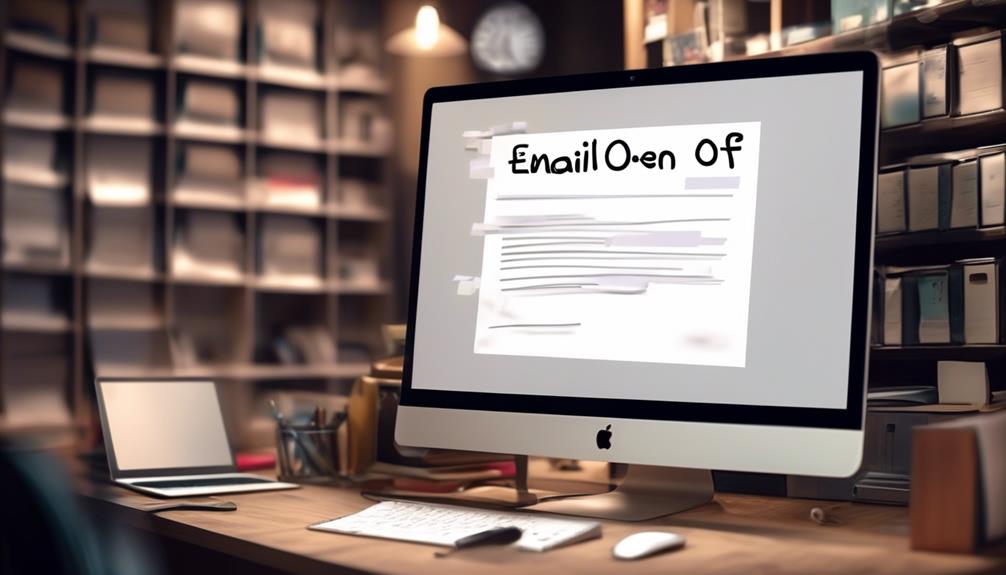
We appreciate the importance of maintaining a professional tone in our communication with professors about research opportunities, and a crucial aspect of this is the closing and sign-off in our emails.
When crafting the closing and sign-off of our emails to professors about research opportunities, it's essential to remember the significance of expressing gratitude and respect. This is the last impression we leave, and it should reflect our appreciation for the professor's time and consideration.
Here are some tips for a contextually relevant and emotionally resonant closing and sign-off:
- Express gratitude: Thank the professor for considering your email and for their time. This shows respect and acknowledges the professor's expertise and busy schedule.
- Convey enthusiasm: Use a closing statement that reflects your interest in the topic and your eagerness to potentially work together. Demonstrating passion and interest in the professor's research can make your email more compelling and memorable.
In closing, we understand the importance of ending our emails to professors on a positive and respectful note. By following these guidelines, we can effectively convey our appreciation and interest while maintaining a professional and courteous tone.
Proofreading and Polishing
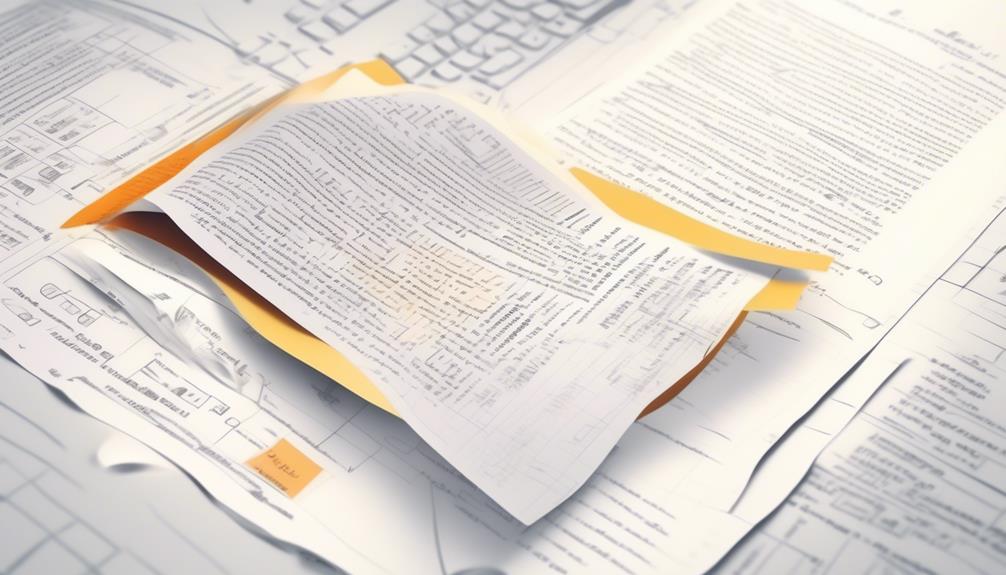
To ensure the professionalism and impact of our communication with professors, we meticulously review our emails for spelling and grammar errors, ensuring clarity and precision. As junior students majoring in various fields, it is crucial to exhibit proficiency in our written correspondence, especially when reaching out to esteemed faculty members for potential opportunities in their research group or lab. Proofreading and polishing our emails before sending them is an essential step in conveying our dedication and respect for the recipient's time and expertise.
| Proofreading Tips | Example |
|---|---|
| Check for spelling and grammar errors | "I am interested in participating in independent research with your lab." |
| Ensure the email is well-structured and organized | Use paragraphs and bullet points to present information clearly. |
| Double-check that the content is clear and concise | "I have completed coursework in molecular biology and am eager to apply my skills in a research setting." |
| Consider asking a peer or mentor for feedback | "Could you please review this email and provide any suggestions for improvement?" |
Following Up

After sending an initial email expressing interest in research opportunities, it's important to send a polite and concise follow-up email if a reply isn't received after a couple of weeks. When following up, it's crucial to express gratitude for the professor's consideration and reiterate your genuine interest in discussing research opportunities. It's important to be considerate of the professor's time and workload, as they're often busy with various commitments.
Here's how to evoke an emotional response in the audience:
- Subtle Persistence: Waiting for a reply can be nerve-wracking, but maintaining a polite and patient demeanor can convey your commitment and respect for the professor's time. This demonstrates perseverance and dedication, qualities that resonate well with mentors.
- Gracious Acknowledgment: Expressing gratitude for the professor's consideration, even in the follow-up email, reflects humility and demonstrates a deep respect for the professor's expertise and time. This will likely resonate with the professor and could possibly increase the likelihood of a favorable response.
What Should I Include in an Email to a Professor About Research?
When emailing a professor for research, be concise and clear about your purpose. Include your introduction, the reason for reaching out, any relevant experience or qualifications, and a specific request. Respect their time and keep your email professional and courteous. Remember to proofread before hitting send.
Frequently Asked Questions
How Do You Email a Professor to Ask About Research?
We email a professor to inquire about research by crafting a polite and concise message.
We introduce ourselves, express interest in their research, and request an opportunity to discuss potential collaboration.
It's essential to demonstrate knowledge of the professor's work and to articulate our own research interests.
We aim to convey professionalism, enthusiasm, and a genuine desire to contribute to their research endeavors.
How Do You Write an Email Asking for Research Collaboration?
We usually start by expressing our interest in the professor's research and highlighting our own expertise.
Then, we propose a potential collaboration and outline the benefits for both parties.
We also suggest a meeting to discuss the details further.
This approach demonstrates our enthusiasm, knowledge, and willingness to contribute.
It's essential to be clear, concise, and respectful in our communication, emphasizing the mutual value of the collaboration.
How Do You Write a Professional Email to a Professor?
We write professional emails to professors by following a specific structure.
- First, we should open with a respectful salutation.
- Next, we need to clearly state our purpose for writing the email.
- After that, it's important to provide any relevant context or information that the professor needs to know.
- Finally, we should express gratitude for the professor's time and consideration.
In addition to the structure, there are other important factors to consider.
- We should strive to be concise in our emails, getting straight to the point without unnecessary details.
- It's also crucial to use formal language and avoid slang or casual expressions.
- Proofreading before sending the email is essential to catch any spelling or grammar errors.
- Furthermore, we should ensure that our email is professional in both formatting and tone.
Lastly, it's crucial to remember that professors are busy individuals.
- As a result, being respectful of their time is of utmost importance.
How to Do Research Under a Professor?
Doing research under a professor is an incredible opportunity to gain hands-on experience and expand our knowledge. We learn by actively engaging in real-world projects, receiving mentorship, and contributing to the advancement of knowledge. It's a chance to immerse ourselves in a field we're passionate about and make a meaningful impact.
The experience is invaluable and sets the stage for future success in academia and beyond.
Conclusion
After crafting a well-written email to a professor about research, it's like planting a seed in fertile ground. The care and effort put into each word and detail will determine the growth and success of the communication.
Just as a seed needs nurturing to bloom, a carefully constructed email can lead to fruitful opportunities in the world of academia.
So, take the time to cultivate your communication skills and watch your efforts yield great results.

